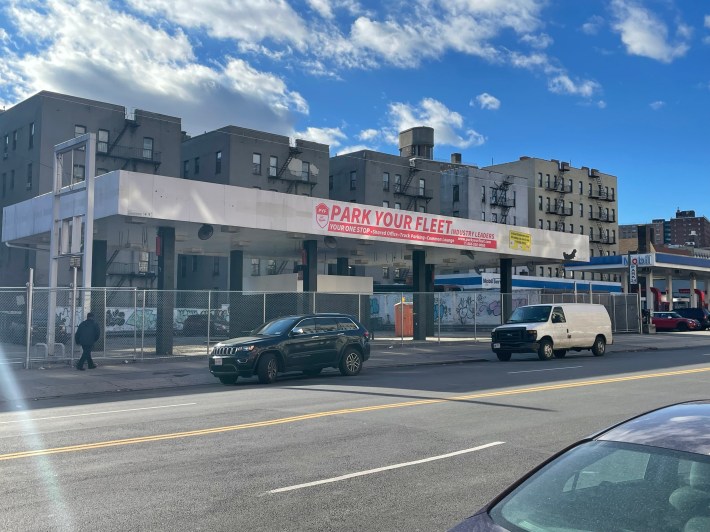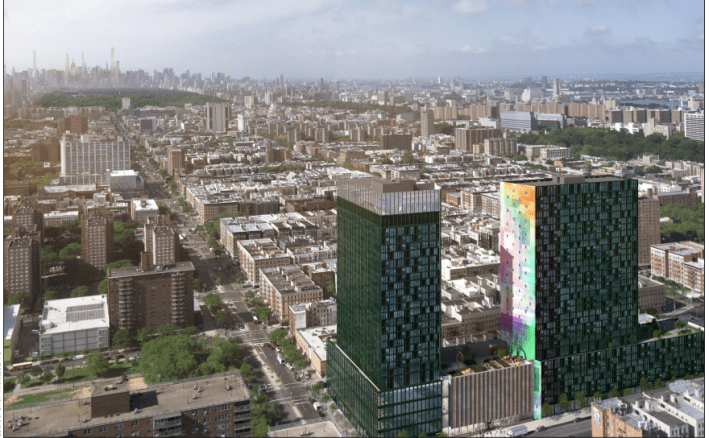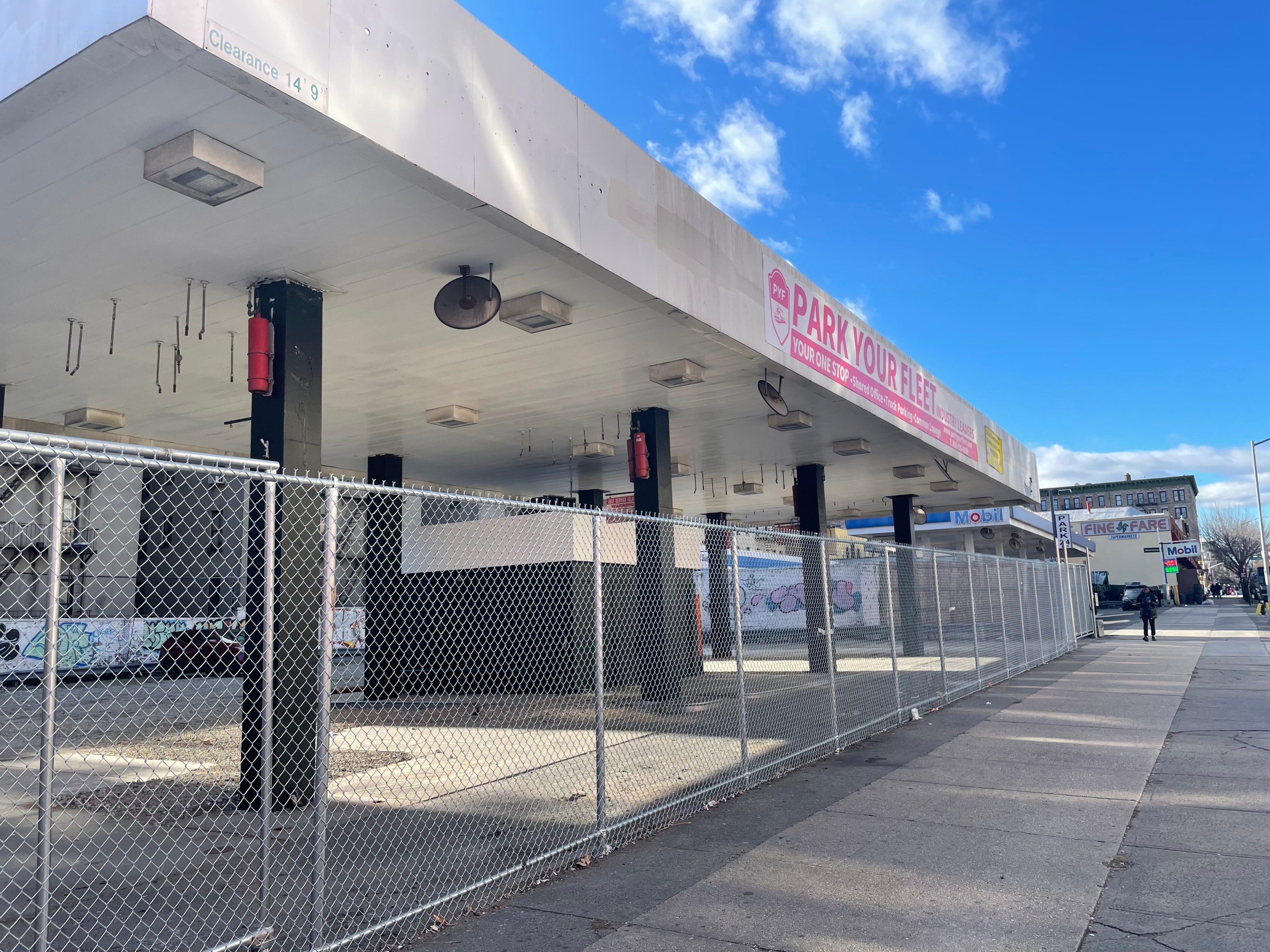Park and deride.
A detested truck depot opened in Harlem on Wednesday morning on the site of what could have been affordable housing and revamped open space — and the would-be residential developer turned self-proclaimed victim chided the local council member for opposing his request to rezone the L-shaped lot in the first place.
The developer, real-estate bigwig Bruce Teitelbaum, said he was "forced" to withdraw his application in April to rezone the site at W. 145th Street and Lenox Avenue after Manhattan Council Member Kristin Richardson Jordan doubled down on her hostility to his proposal — a pair of 32-story buildings comprising more than 900 units of housing, retail space, and a Museum of Civil Rights (in partnership with Rev. Al Sharpton), called One45. According to the city's 1961 citywide zoning code, only “automative and other heavy commercial services” as well as market-rate housing is permitted on the site.
Teitelbaum says he was left with no option but to move ahead with spaces for commercial trucks instead of the people of Harlem. A sign bearing the words, "Park Your Fleet," instead of "If You Lived Here, You'd Be Home By Now" is now looming above 145th Street.

“Today, instead of celebrating the construction of 917 units of desperately needed housing in Harlem … we are reluctantly commencing with Plan B that starts with a truck depot,” Teitelbaum, who was a key figure in the Giuliani City Hall, said in a statement.
As part of the rezoning, Teitelbaum says he also would have reconstructed the playground within Brigadier General Charles Young Playground and redesigned the street. Though exactly what his plans were for a street redesign remain unclear, and he declined to comment further.
But now that the depot is up and running, with massive trucks starting to rumble through, members of the community are as equally appalled that instead of more housing they’re getting more pollution — in an area that already suffers from a high rate of child hospitalizations associated with pollution-induced asthma. According to city health data, that section of Harlem adjacent to the 145th Street bridge to the Bronx had an annual rate of 39.2 per 100,000 children, more than double the citywide average.
Ruth Williams, who lives across the street, says she fears what it will mean for those already suffering from respiratory and other diseases.
“The air around here, that’s what we be breathing,” she told Streetsblog. "Exhaust is coming out of those trucks. That alone is gonna kill us. You got exhaust coming from the buses. Now you’re gonna have exhaust coming from the trucks, the parking. Too many trucks, too many cars around here."
Soon after Teitelbaum revealed his controversial plan B, Harlem residents warned that the decision to put profit over people’s health will send more pollution-spewing big rigs into the low-income community of color and worsen the environmental injustice already facing the neighborhood.
“Communities of color and low-income, like Central Harlem, are already burdened with more than their fair share of pollution. Siting yet another source of dangerous air pollution in this community is either a scare tactic designed to restart negotiations or an overt act of environmental racism. Harlem does not deserve this,” Lonnie Portis, WE ACT for Environmental Justice’s Environmental Policy and Advocacy Coordinator, said in October.
Still, others want affordable housing — not the project Teitelbaum offered.
“We would prefer affordable housing. Affordable. Not a 30-story building, like they wanted. Too high,” said Diane Matthews.

Chucky, who lives in the area and declined to provide his last name, agreed, saying the only thing the community needs is low-income housing, calling the truck depot an “eyesore.”
“It’s needed around here, affordable housing. Not that sky-high shit. If you have sky-high shit, how the hell people from the neighborhood gonna get in there,” he said.
In addition to the truck depot, Teitelbaum says he’s now also looking into building a self-storage facility as well as market-rate and luxury housing.
And part of the controversy is the ongoing public feud between the developer and the local pol.
Teitelbaum claims Richardson Jordan has rejected all attempts to meet with him, while Richardson Jordan claims that Teitelbaum is the sole villain for building above market rate, even luxury housing in a low-income community, potentially displacing longtime residents who can no longer afford the higher costs of living.
“Council Member Richardson Jordan refuses to meet with me. She has publicly made her position clear, which is adamantly and consistently refusing to even consider 50-percent affordability. But she refuses to meet with me to discuss or negotiate,” Teitelbaum told Streetsblog.
In response, Richardson Jordan criticized not only Teitelbaum, but the media, too.
“We already proposed a compromise to at minimum meet our community standards, it is on Teitelbaum to take the deal,” she said, referencing other developments, like Timbale Terrace, and Marcus Garvey Village, that she says are more in line with community needs. “I do not see why I have to keep repeating the same statements, the news reports on this have been so god awful.”
Manhattan Borough President Mark Levine earlier this week issued a statement calling for a second shot at a rezoning to allow for affordable housing, calling the truck depot “unacceptable.”
“This location deserves far, far better than a truck depot. We need housing on this site. Families are leaving Northern Manhattan every day because they can’t find an affordable apartment,” said Levine. “It’s time to make another attempt at a rezoning for this site. My office is committed to doing everything possible to work towards a deal that would bring desperately needed housing, while maximizing affordability at levels accessible to the community.”
The corner of Lenox Av & 145th in Harlem is the heart of one of NYC’s most dynamic neighborhoods, right next to a subway station.
— Mark D. Levine (@MarkLevineNYC) January 15, 2023
A vacant property at this location is opening as a *truck stop* this coming week. (yes really)
This is unacceptable. We need housing on that site.🧵 pic.twitter.com/psDLXMZTTM
A spokesperson for City Hall similarly alluded to trying again on building housing at the site, and for the rest of Harlem.
“As the city’s housing shortage continues to exacerbate our affordability crisis, developers and communities must work together to create more housing, especially housing that all New Yorkers can afford. We will continue working with all of our partners on a comprehensive effort to bring much-needed affordable housing to Harlem and every neighborhood in New York City," said the spokesperson.






